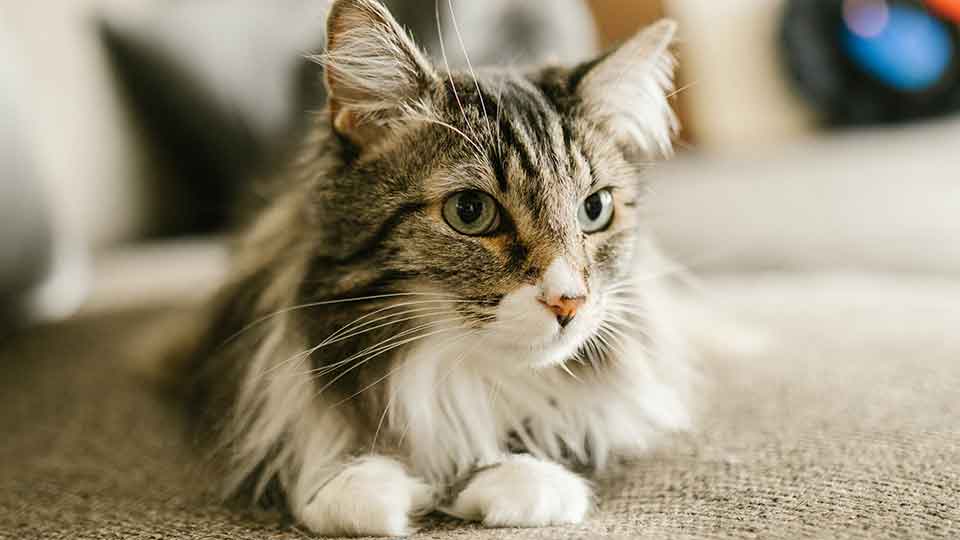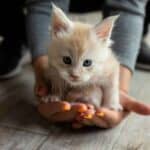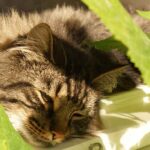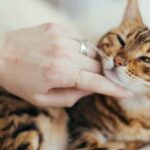Maine Coon kittens are adorable, fluffy, and playful.
They are also very curious, intelligent, and social.
They love to explore their surroundings, learn new things, and interact with their owners.
But what if you must leave your Maine Coon kitten alone for some time?
How will they cope with your absence?
How long can you leave them alone without causing them stress or harm?
Can Maine Coon Kittens Be Left Alone?
The short answer is no.
Maine Coon kittens should not be left alone for long periods, especially if they are younger than six months old.
Maine Coon kittens depend on their mother and littermates for physical and emotional development.
They need constant care, attention, and stimulation to grow healthy and happy.
If they are separated from their mother too early or left alone for too long, they may develop behavioral problems, such as aggression, anxiety, or depression.
Maine Coon kittens also have a lot of energy and need to exercise and play regularly.
They may get bored and frustrated if left alone without toys or activities.
They may start to scratch, chew, or destroy your furniture, carpets, or curtains.
They may also develop bad habits like spraying, litter box avoidance, or excessive vocalization.
Maine Coon kittens are very social and bond firmly with their owners.
They crave human interaction and affection.
They like following you around the house, sitting on your lap, or sleeping beside you.
They may feel lonely and sad if left alone without any company.
They may lose their appetite, become lethargic, or show signs of separation anxiety.
Therefore, if you want to adopt a Maine Coon kitten, you need to make sure that you have enough time and resources to take care of them properly.
You need to be prepared to spend at least a few hours a day with them, playing with them, grooming them, feeding them, and cuddling them.
You also need to provide them with a safe and comfortable environment to access fresh water, food, a litter box, scratching posts, toys, and hiding places.
How Long Can You Leave Maine Coon Kitten Alone?
The length of time you can leave your Maine Coon kitten alone depends on several factors, such as their age, personality, health condition, and the quality of your relationship with them.
However, as a general rule of thumb, you should not leave your Maine Coon kitten alone for more than four hours at a time.
If you have to leave them alone for longer than that, arrange for someone to check on them regularly.
Ideally, you should not leave your Maine Coon kitten alone overnight.
Here are some guidelines on how long you can leave your Maine Coon kitten alone based on their age:
• 0-8 weeks: You should never leave your Maine Coon kitten alone at this age. They need their mother’s milk and warmth to survive.
They also need their mother’s guidance and socialization to learn to be a cat.
• 8-12 weeks: You should only leave your Maine Coon kitten alone for short periods (less than an hour) at this age.
They are still very young and vulnerable. They need frequent feeding (every 3-4 hours) and supervision (every 15-30 minutes) to prevent accidents or injuries.
• 12-16 weeks: You can leave your Maine Coon kitten alone for up to two hours at this age.
They are more independent and confident at this stage. They can eat solid food (every 4-6 hours) and use the litter box on their own.
However, they still need a lot of stimulation and socialization to develop their skills and personality.
• 16-24 weeks: You can leave your Maine Coon kitten alone for up to four hours at this age.
They are more mature and stable at this point. They can eat adult food (every 6-8 hours) and regulate their body temperature better.
However, they still need much attention and affection to maintain their bond with you.
• 24 weeks and older: You can leave your Maine Coon kitten alone for longer periods (up to eight hours) at this age.
They are fully grown and developed at this stage.
They can eat once or twice daily and better cope with temperature changes. However, they still need interaction and entertainment to keep them happy and healthy.
What to Provide For Your Maine Coon When You Are Out?
If you must leave your Maine Coon kitten alone for some time, you must ensure that you provide them with everything they need to stay comfortable and content.
Here are some things that you should provide for your Maine Coon when you are out:
• Water: You should always leave fresh and clean water for your Maine Coon kitten.
You can use a water bowl, a fountain, or a bottle.
You should change the water daily and clean the container regularly.
You should also place the water in a quiet and accessible location, away from the food and litter box.
• Food: You should leave enough food for your Maine Coon kitten, depending on how long you are away.
You can use dry food, wet food, or a combination of both.
You should follow the feeding instructions on the package and adjust the amount according to your kitten’s age, weight, and activity level.
It would help if you also used a food bowl, a dispenser, or a puzzle feeder.
You should clean the bowl or feeder regularly and dispose of any leftover food.
• Litter box: Leave a clean and spacious litter box for your Maine Coon kitten.
You can use clumping or non-clumping litter, depending on your preference.
You should scoop the litter box daily and change the litter weekly. You should also place the litter box in a private and convenient location, away from the water and food.
• Scratching posts: You should leave several scratching posts for your Maine Coon kitten.
You can use vertical or horizontal posts, made of sisal, carpet, or wood.
Place the posts strategically near the windows, doors, or furniture.
You should also encourage your kitten to use the posts by rubbing catnip or treats.
• Toys: You should leave a variety of toys for your Maine Coon kitten.
Use interactive toys like balls, mice, feathers, or lasers.
You can also use passive toys like tunnels, boxes, or paper bags.
You should rotate the toys every few days to keep your kitten interested and stimulated.
• Hiding places: You should leave some places for your Maine Coon kitten.
You can use beds, blankets, baskets, or crates. Place the hiding places in cozy and quiet locations, such as under the bed, behind the sofa, or in the closet.
You should also respect your kitten’s privacy and let them hide when they want to.
Do Maine Coon Cats Need A Companion?
Maine Coon cats are very social and enjoy the company of other animals and humans.
They prefer to be with others for long periods.
Therefore, if you have a busy schedule or travel frequently, you may consider getting another companion for your Maine Coon cat.
Another companion can provide your Maine Coon cat with friendship, entertainment, and comfort when you are away.
They can also help your Maine Coon cat burn off some energy and reduce boredom.
However, not all companions are suitable for your Maine Coon cat.
Here are some factors that you should consider when choosing a companion for your Maine Coon cat:
• Age: The best age to introduce a new companion to your Maine Coon cat is when they are still young (less than six months old).
Younger cats are more adaptable and open to new experiences than older cats. Older cats may be more territorial and resistant to change than younger cats.
• Gender: The best gender to match with your Maine Coon cat is usually the opposite gender.
Male and female cats tend to get along better than same-sex cats.
Same-sex cats may compete for dominance or resources more than opposite-sex cats.
• Breed: The best breed to pair with your Maine Coon cat is usually another Maine Coon cat or a similar breed.
Maine Coon cats have a distinctive personality and temperament that may not be compatible with other breeds.
For example, Maine Coon cats are very active and playful, while Persian cats are very calm and quiet.
• Personality: The best personality to complement your Maine Coon cat is usually similar or compatible with theirs.
For example, if your Maine Coon cat is outgoing and friendly, you may want to choose a companion that is also outgoing and friendly.
If your Maine Coon cat is shy, you may want to choose a companion that is also timid or gentle and patient.
• Health: The best health condition to ensure your Maine Coon cat and their companion is optimal and stable.
You should ensure both cats are vaccinated, dewormed, spayed/neutered, microchipped, and tested for any diseases or parasites before introducing them to each other.
You should also monitor their health regularly and consult your veterinarian if you notice any signs of illness or injury.
Do Cats Get Lonely?
Cats are often perceived as independent and aloof creatures, who do not need much human interaction or attention.
However, this is a misconception. Cats can be very social and emotional animals, forming strong bonds with their owners and other animals.
Cats can get lonely, especially if they are left alone for long periods or do not have any companionship.
Loneliness can affect cats differently, depending on their personality, breed, age, and environment.
Some signs of loneliness in cats are:
• Excessive vocalization: Lonely cats may meow, yowl, or cry more than usual, especially at night or when you are away. They may be trying to communicate their distress or call for attention.
• Destructive behavior: Lonely cats may scratch, chew, or destroy your furniture, carpets, or curtains. They may try to relieve their boredom or frustration or mark their territory.
• Litter box problems: Lonely cats may stop using or misuse the litter box. They may be trying to express their dissatisfaction or anxiety or seek your attention.
• Changes in appetite: Lonely cats may lose their appetite or overeat. They may be trying to cope with their sadness or stress or fill their emotional void.
• Changes in grooming: Lonely cats may groom themselves excessively or neglect their grooming. They may be trying to soothe themselves or show their depression.
• Changes in sleeping: Lonely cats may sleep more or less than usual. They may try to escape from reality or stay alert for signs of danger.
• Changes in activity: Lonely cats may become more restless or lethargic. They may be trying to burn off some energy or lose interest in everything.
• Changes in mood: Lonely cats may become more aggressive or withdrawn. They may be trying to protect themselves or isolate themselves from others.
If you notice any of these signs in your cat, try to address the root cause of their loneliness and provide them with more stimulation and affection.
Here are some ways to help your cat overcome their loneliness:
• Spend more time with your cat: You should try to spend at least 15 minutes a day with your cat, playing with them, grooming them, feeding them, and cuddling them.
You should also talk to your cat and praise them often. This will help your cat feel loved and secure.
• Get another companion for your cat: You should consider getting another cat or a compatible animal, as long as they get along well and have enough space and resources.
This will help your cat have a friend to play with, groom with, and snuggle with when you are away.
• Provide enrichment for your cat: You should provide them with various toys, scratching posts, hiding places, and windows to keep them entertained and stimulated.
You should also rotate the toys every few days to keep them interested.
You can also use interactive toys, such as balls, mice, feathers, or lasers, that can be controlled remotely by your phone or a timer.
This will help your cat have some fun and exercise when you are away.
• Hire a pet sitter or a neighbor: You should hire a pet sitter or ask a neighbor to check on your cat regularly when you are away for longer than four hours.
They can feed your cat, clean the litter box, play with your cat, and give them some attention.
This will help your cat feel less lonely and anxious when you are away.
Loneliness can hurt your cat’s health and happiness. Therefore, you should try to prevent it by providing your cat with enough socialization and stimulation.
You should also monitor your cat’s behavior and mood and consult your veterinarian if you notice any signs of loneliness or other problems.
FAQ
Can Maine Coon Cats Be Left Alone At Night?
Maine Coon cats can be left alone at night if they are well-adjusted and comfortable in their environment.
However, some Maine Coon cats may not like being left alone at night for various reasons, such as:
- They are nocturnal: Cats are naturally nocturnal animals, which means they are more active and alert at night than during the day. They may want to hunt, play, explore, or socialize at night when you are asleep.
- They are bored: Cats may get bored at night if they do not have anything to do or anyone to interact with. They may look for ways to entertain themselves by making noise, scratching furniture, knocking things over, or jumping on you.
- They are lonely: Cats may feel lonely at night if they do not have any companionship. They may miss you and seek your attention by meowing, cuddling, or licking you.
- They are hungry: Cats may get hungry at night if they do not have enough food or water. They may try to wake you up or find something to eat in the kitchen or the trash.
- They are scared: Cats may get scared at night if they hear or see something unfamiliar or threatening. They may hide, run, or attack anything that moves.
If you want to leave your Maine Coon cat alone at night, try to make them as comfortable and content as possible.
Leaving your Maine Coon cat alone at night is not necessarily bad for them if they are happy and healthy.
Can Maine Coon Cats Be Indoor Cats Only?
Maine Coon cats can be indoor cats only if they are provided with enough stimulation and enrichment in their environment.
However, some Maine Coon cats may prefer to have some outdoor access for various reasons, such as:
- They are curious: Cats are naturally curious animals, who like to explore their surroundings and discover new things. They may want to see what is outside their window, such as birds, squirrels, or other cats.
- They are adventurous: Cats are naturally adventurous animals, who like to have some fun and excitement in their lives. They may want to experience different sights, sounds, smells, and textures outside their home.
- They are territorial: Cats are naturally territorial animals, who like to mark their boundaries and defend their space from intruders. They may want to patrol their territory outside their home and assert their dominance over other cats.
- They are hunters: Cats are naturally hunters, who like to chase and catch their prey. They may want to hunt for rodents, insects, or birds outside their home and satisfy their predatory instincts.
If you want to keep your Maine Coon cat indoors only, you can give them enough space and plenty of toys for enrichment.
Why Isn’t My Maine Coon A Lap Cat?
Maine Coon cats are known for being very friendly and affectionate.
They love to be around their owners and other animals.
However, some Maine Coon cats may not like to be lap cats for various reasons, such as:
- They are independent: Cats are naturally independent animals, who like to have some control over their own lives. They may not like to be lap cats because they feel restricted or confined by your arms or legs. They may prefer to sit next to you or on the floor instead of on your lap.
- They are hot: Cats have a higher body temperature than humans, so they can get hot easily. They may not like to be lap cats because they feel too warm or uncomfortable on your lap. They may prefer to sit on a cool surface or in a shady spot instead of on your lap.
- They are scared: Cats can fear many things, such as loud noises, sudden movements, or unfamiliar people or animals. They may not like to be lap cats because they feel vulnerable or exposed on your lap. They may prefer to sit in a safe and hidden place instead of on your lap.
- They are hurt: Cats can suffer from various health problems, such as arthritis, obesity, or dental issues. They may not like to be lap cats because they feel pain or discomfort on your lap. They may prefer to sit in a comfortable and supportive place instead of on your lap.
If you want your Maine Coon cat to be a lap cat, try to make them as comfortable and happy as possible. Here are some tips on how to do that:
- Respect their choice: You should respect your cat’s choice whether they want to be a lap cat. You should not force or bribe them to sit on your lap if they do not want to. You should also not punish or scold them if they refuse to sit on your lap. You should accept their personality and love them for who they are.
- Encourage them gently: You should encourage your cat gently and gradually to sit on your lap if they show some interest or curiosity. You should use positive reinforcement, such as praise, treats, or toys, to reward them for sitting on your lap. You should also use gentle strokes, soft words, or soothing sounds to calm and relax them on your lap.
- Provide comfort: You should provide your cat with comfort and security when they sit on your lap. You should use a blanket, a pillow, or a cushion to make your lap more cozy and inviting for them. Avoid distractions or disturbances that may scare them away from your lap, such as loud noises, sudden movements, or unfamiliar people or animals.
- Provide health care: You should regularly provide your cat with health care and check-ups to prevent or treat any health problems that may affect their willingness to sit on your lap. You should consult your veterinarian if you notice any signs of illness or injury in your cat, such as limping, drooling, or losing weight.
Some Maine Coon cats may never become lap cats no matter what you do.
However, this does not mean they do not love or enjoy your company.
They may show their affection in other ways, such as rubbing against you, purring near you, or sleeping beside you.
You should appreciate their unique way of expressing their love and bond with them accordingly.







